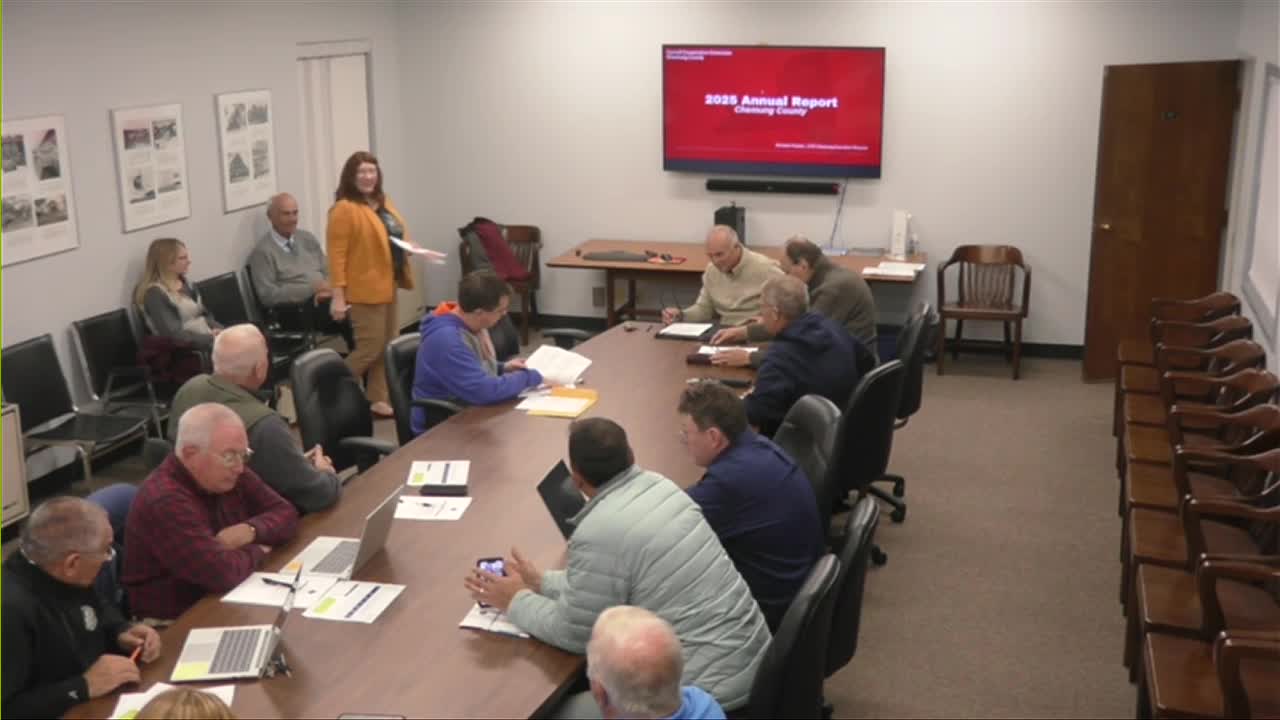Cornell Cooperative Extension summarizes 2025 programs, funding and service changes to Chemung County committee
Get AI-powered insights, summaries, and transcripts
Subscribe
Summary
Michelle Podolak, executive director of Cornell Cooperative Extension in Chemung County, reviewed program highlights, funding structure and service changes — including the loss of SNAP‑Ed funding — and asked for continued county support at a county committee meeting.
Michelle Podolak, executive director of Cornell Cooperative Extension in Chemung County, told a Chemung County committee meeting that the extension’s work spans youth development, agriculture, natural resources and community programs and depends on county appropriations for its base budget.
"Our job is to put knowledge to work for you," Podolak said, describing the Extension's role and funding flow from the federal Smith‑Lever Act of 1914 through Cornell University and New York State to local offices. She told the committee that county appropriations provide the base that allows the local office to leverage additional state and federal funds.
The presentation summarized program numbers and recent changes. Podolak said the office has 17 staff members plus interns; the county provides $96,000 in in‑kind rent for space at the Human Services Building in the 2025 budget; and the county appropriation allows the office to leverage roughly 4.7 times more funding from state and federal sources. "Without the county, there is no cooperative extension in Chemung County," she said.
Podolak highlighted 4‑H and youth programming growth: membership in county 4‑H has more than doubled since 2021, the office supports 14 clubs, and a one‑week day camp at the fairgrounds returned this year. She said more than half of the campers were new to 4‑H, helping recruit new participants. At the county fair, Podolak said, the 4‑H program fielded about 164 exhibitors and roughly 500 member‑made projects; about 20 youth then represented the county at the state fair with more than 75 projects entered.
The Extension’s after‑school 4‑H program served about 650 students across three sites in Elmira, Spencer and Waverly, and in‑school programs such as "ag in the classroom" reached hundreds of students with activities including apple and cheese tastings, Podolak said. She described a natural resources initiative that reached more than 1,200 participants across 47 classes and events and a junior watershed steward certificate program for ages 15–18 run with the Chemung County Soil and Water Conservation District and the Susquehanna River Basin Commission.
Podolak said the office is wrapping up a Department of Homeland Security planning grant, Elmira Urban Green Equity, which identified community interest in a municipal tree program and volunteer tree‑planting efforts. She also described household hazardous waste events (the spring event collected from 415 households; the fall event had contact from more than 800 people) and said volunteers contributed more than 120 hours to that effort.
On energy and housing, Podolak said a NYSERDA‑linked weatherization effort reached about 2,615 people in Chemung County and more than 80 projects; the Extension is also finalizing a workforce development grant to train certified contractors and weatherization inspectors.
Podolak reported that SNAP‑Ed nutrition education funding ended Sept. 30 and the program as previously run will stop. Because of county support she said the Extension retained a nutritionist and will continue some nutrition outreach in a revised form, but the broader SNAP‑Ed grant work will no longer operate as before. "Last year, we were able to go out to 318 classes and to reach 1,200 people directly," she said, summarizing recent reach.
Podolak closed by outlining upcoming events (an annual meeting Nov. 8 with a farmers and friends breakfast) and fundraising plans to replace about $1,600 in scholarship support formerly provided by Joanne Fabrics so more children can attend camp. Podolak invited county officials and residents to participate in Extension events and volunteer efforts.
A committee member offered public praise for the Extension's deer‑management outreach in Elmira Heights, saying Extension staff attended a 30–35 person meeting, provided materials, continued follow‑up and "squeezed every last dollar" from the county appropriation. Podolak and staff answered a small number of follow‑up questions from committee members about specific programs.
Podolak and two advisory board members who accompanied her identified a range of future program priorities including decluttering/hoarding help, emergency management coordination, business advising and expanded volunteer recruitment.
